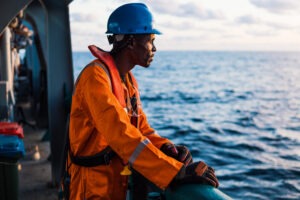
In the intricate world of maritime law, where complexities abound and cases demand a specialized approach, law firms often find themselves navigating turbulent waters when it comes to client acquisition. Maritime injury cases, in particular, require a nuanced understanding of both legal intricacies and industry-specific nuances. Amidst these challenges, legal call centers emerge as invaluable assets, serving as a crucial bridge between law firms and potential clients.
At Legal Conversion Center, our expertise in communication, lead generation, and client engagement, can help your law firm secure more maritime injury clients. Whether you’re looking for a Read our guide below to find out more!
Understanding the Maritime Injury Landscape
Maritime injury cases encompass a wide array of incidents, ranging from offshore accidents to injuries sustained aboard vessels. These cases are governed by a complex web of maritime laws and regulations, including the Jones Act, Longshore and Harbor Workers’ Compensation Act (LHWCA), and general maritime law. Due to the intricate nature of maritime law, individuals who suffer injuries at sea often seek legal representation to navigate the complexities and pursue rightful compensation.
Maritime injury claims encompass a wide range of incidents and injuries that occur in maritime environments, including oceans, seas, rivers, and other bodies of water. These claims often involve complex legal issues governed by maritime law. Some of the most common maritime injury claims include:
- Jones Act Claims: The Jones Act, also known as the Merchant Marine Act of 1920, provides protections for seamen who are injured while working aboard vessels in navigable waters. Jones Act claims typically arise from injuries caused by negligence on the part of the vessel owner, operator, or fellow crew members.
- Slip and Fall Injuries: Slip and fall accidents are among the most common maritime injuries and can occur on decks, gangways, or other surfaces aboard vessels. These accidents may result from slippery conditions, inadequate maintenance, or failure to provide proper safety equipment.
- Falling Overboard: Accidents involving crew members or passengers falling overboard can lead to serious injuries or fatalities. Factors contributing to falling overboard may include rough seas, unstable conditions aboard the vessel, or lack of appropriate safety measures.
- Crush Injuries: Crush injuries can occur when heavy equipment, cargo, or machinery on board a vessel causes physical harm to crew members or passengers. These injuries may result from negligent operation, inadequate training, or failure to properly secure equipment.
- Lifting and Strain Injuries: Maritime workers often engage in physically demanding tasks such as lifting heavy cargo or equipment. Improper lifting techniques, inadequate training, or lack of proper equipment can lead to strains, sprains, and other musculoskeletal injuries.
- Chemical Exposures: Workers aboard vessels may be exposed to hazardous chemicals and substances, leading to injuries such as burns, respiratory problems, or other health issues. Chemical exposures can occur due to leaks, spills, or improper handling of hazardous materials.
- Collisions and Groundings: Collisions between vessels or accidents involving groundings can cause serious injuries to crew members and passengers. These incidents may result from navigational errors, equipment failures, or adverse weather conditions.
- Fire and Explosion Accidents: Fires and explosions aboard vessels can cause catastrophic injuries and fatalities. These incidents may be caused by fuel leaks, electrical malfunctions, or improper storage of flammable materials.
- Drowning and Near-Drowning: Accidents resulting in drowning or near-drowning can occur due to falls overboard, capsizing, or other emergencies at sea. Prompt rescue efforts and access to proper safety equipment are critical in preventing such incidents.
- Repetitive Motion Injuries: Maritime workers may develop repetitive motion injuries such as carpal tunnel syndrome or tendonitis due to the repetitive nature of their work activities, such as operating machinery or performing repetitive tasks over extended periods.
If your law firm is looking to acquire more clients with cases like these, Legal Conversion Center can help! From virtual reception to client intake, text and web responses, and bilingual support, we offer comprehensive services to help turn leads into cases.
Challenges in Client Acquisition
For law firms specializing in maritime injury cases, acquiring clients presents a unique set of challenges. Unlike other areas of law, maritime injury cases involve individuals who may be located offshore or in remote maritime locations, making it difficult for law firms to directly reach potential clients. Additionally, the specialized nature of maritime law requires firms to demonstrate expertise and credibility in the field to attract clients effectively.
The Role of Legal Call Centers
Legal call centers like Legal Conversion Center offer a strategic solution to the challenges faced by law firms in acquiring maritime injury clients. These specialized call centers are staffed with trained professionals who possess a deep understanding of legal processes and client communication. By leveraging their expertise, legal call centers assist law firms in various aspects of client acquisition:
- Lead Generation: Legal call centers employ targeted marketing strategies to generate leads specifically tailored to maritime injury cases. Through comprehensive databases and targeted outreach campaigns, they identify individuals who have been involved in maritime accidents and may require legal assistance. This proactive approach ensures that law firms have a steady stream of potential clients to engage with.
- Initial Consultations: One of the primary functions of legal call centers is to conduct initial consultations with potential clients on behalf of law firms. Trained professionals at these call centers gather pertinent information about the incident, assess the viability of the case, and provide preliminary legal guidance. By handling initial inquiries efficiently, legal call centers alleviate the burden on law firms and streamline the client intake process.
- Qualification and Screening: In addition to gathering information, legal call centers play a crucial role in qualifying and screening potential clients. Through detailed interviews and thorough assessments, they evaluate the merits of each case, ensuring that law firms invest their resources wisely. By filtering out cases with limited potential, legal call centers enable law firms to focus their efforts on high-value clients with stronger chances of success.
- Appointment Scheduling: Once a potential client is deemed suitable for representation, legal call centers facilitate the appointment scheduling process. They coordinate appointments between clients and attorneys, ensuring that consultations take place in a timely manner. This seamless coordination enhances client satisfaction and expedites the progression of cases.
- Follow-Up and Client Engagement: Legal call centers maintain ongoing communication with clients throughout the legal process, providing updates, addressing inquiries, and offering support as needed. By nurturing client relationships and fostering trust, they contribute to higher client satisfaction rates and increased likelihood of referrals. This ongoing engagement underscores the value of legal call centers beyond initial client acquisition.
Benefits for Law Firms
The utilization of legal call centers offers numerous benefits for law firms specializing in maritime injury cases:
- Increased Efficiency: By outsourcing client acquisition tasks to legal call centers, law firms can streamline their operations and focus on core legal activities. This enhanced efficiency allows firms to handle a higher volume of cases effectively.
- Expertise and Specialization: Legal call centers bring specialized expertise in client communication and lead generation, particularly in the realm of maritime law. Their knowledge and experience in the field contribute to more targeted and effective client acquisition strategies.
- Scalability: Legal call centers offer scalability, allowing law firms to adapt to fluctuating demand and expand their client base without the need for extensive internal resources.
- Cost-Effectiveness: Outsourcing client acquisition to legal call centers can be a cost-effective solution for law firms, eliminating the need for significant upfront investments in marketing and infrastructure.
By leveraging the services of legal call centers, law firms can enhance their visibility, attract qualified leads, and ultimately, secure more maritime injury clients, positioning themselves for success in this specialized and dynamic legal niche.
Ready to Get More Maritime Injury Clients?
Is your law firm looking to expand your client base and enhance your practice’s growth? Look no further! Legal Conversion Center is here to help you achieve your goals and secure more maritime injury clients than ever before. At LCC, we understand the challenges that law firms face in acquiring clients in the complex and competitive field of maritime law. That’s why we offer specialized services tailored to meet the unique needs of maritime injury attorneys.
Our team of experienced professionals is dedicated to generating high-quality leads, conducting initial consultations, qualifying potential clients, and scheduling appointments on your behalf. With our expertise in client communication and lead generation, we ensure that you have a steady stream of qualified leads ready to engage with your firm.
Contact us today for a free quote!




